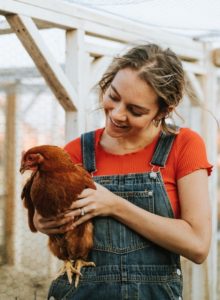Will knowing that billions of male chicks are shredded at birth change what food we buy?

Do we want cheap food and ignore animal welfare and the cost to the environment?
Or should we have a complete understanding of the food we buy to make the right buying choices.
Unfortunately a great deal about our food and farming practices are hidden.
Did you know that around seven billion male chicks, not wanted for meat or eggs, are killed around the world each year, usually by gas, or in shredding machines.
In the UK a further 35 million female egg-laying chickens are killed every year when only 14 months old as they reach their first molt, a natural process normally lasting 2 months where they stop laying eggs to build up their nutrient reserves. (It is cheaper to kill and replace them than wait for them to start laying again).

Sustainable beef regenerating soil?
These are some of the little known, and rather nasty consequences, of a worldwide cheap-food policy where science has been used to produce as much food as possible as quickly as possible. It is often cheaper to kill unwanted animals and process the ‘nutrients’ in to human, or fish, food.
Ever seen ‘reconstituted meat’ on a food label?
“Meat slurry is more malleable than dark meats and eases the process of meat distribution as pipelines may be used”. Wikipedia. YUK!
This issue has been raised because France have banned the culling of unwanted male chicks by the end of 2021. More here. Apparently big business backed scientists are desperately trying to either, work out the sex of the chick before hatching or modify chickens to only lay female chick eggs.

How many chicken get to their second birthday?
It seems odd to me that tax payers money has been used to subsidise many of these practices under the premise that; ‘People want cheap food.’ Taxpayers are paying to subsidise cheap food, then pay again as water rates rise to remove agricultural waste, and pay again with the rising NHS cost of food related disease. More here
Unfortunately when people read the above they can over react and become vegans or vegetarians, often detrimental to their health.
What they, and we all, should be doing is spending a little more on buying meat, dairy and eggs from local sustainable farms that do not follow the practices above. These are farmers that need direct trade to make a better return than the average 9p that farmers get from every £1 spent of food in the supermarket.
Such farms are almost going back 50 years before Cheap Food Policy and intensive factory farming. A time where farmers worked with more traditional varieties of animals such as chickens that did not lay as many eggs or cows that did not produce as much milk as modern breeds. These animals however are more versatile and produce a better product.

Your Local Food Map?
These are traditional sustainable mixed farms using little or no chemicals and synthetic fertilisers and often employ and connect with more local people.
Unfortunately these farms are rare as EU food policy has deemed that small mixed farms are unviable and have directed subsidies at intensive high output farming. Those that have survived, or are starting up, can thrive if they can sell their produce direct to local people at ‘like for like’ supermarket prices. The more customers the more food they will be encouraged to grow.
Many people think we have gone too far down the ‘cheap food policy’ road dominated by supermarkets and Big business. At BigBarn we think we can use technology to encourage change. Change to an enlightened society where we make healthier, more sustainable, food buying choices. And buy from local, more sustainable, farms.
To help please use our shared Local Food Map to find and buy from your local food outlets. The more you buy and support your local producers the more they will be encouraged to increase their range of products.